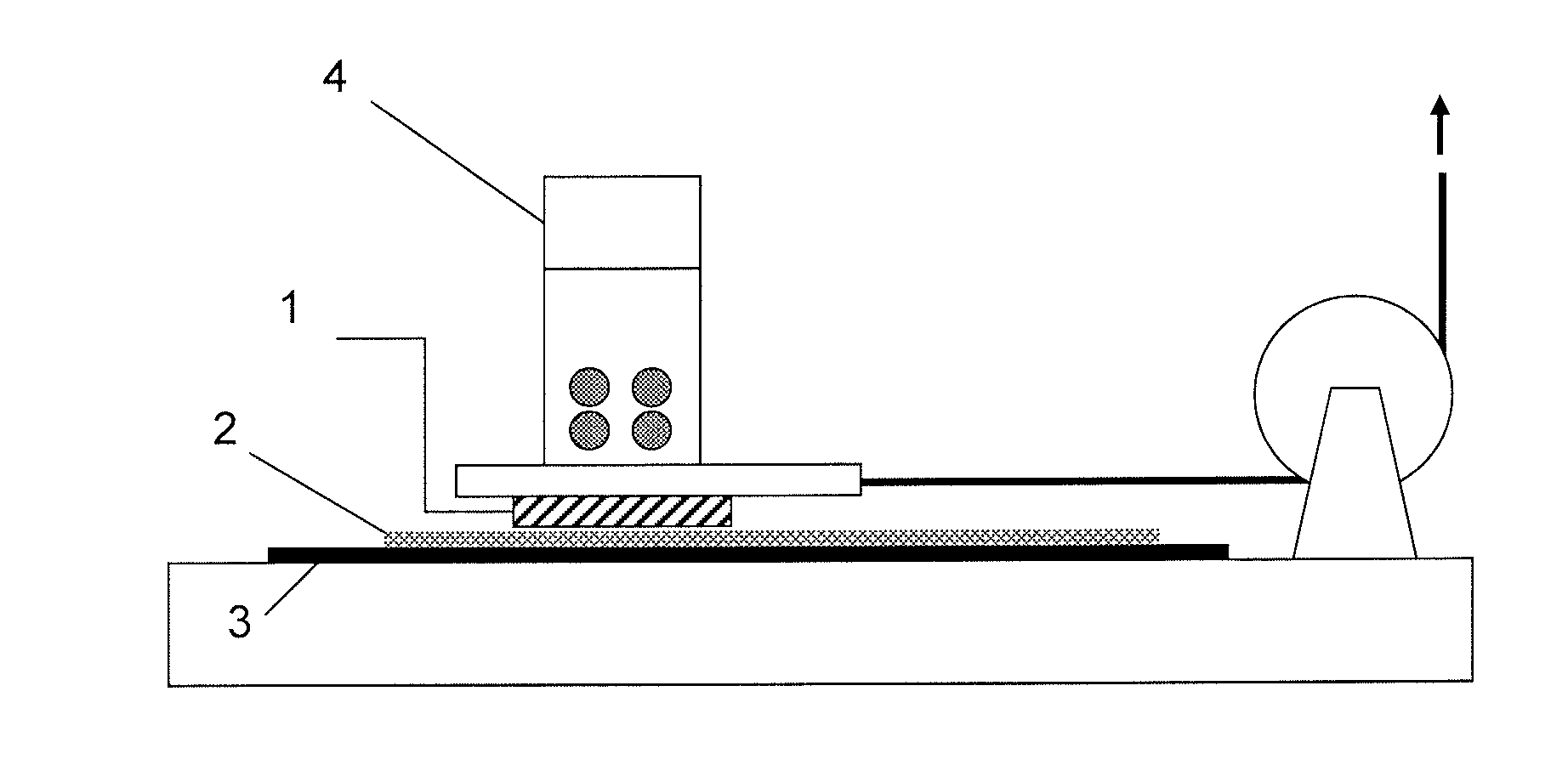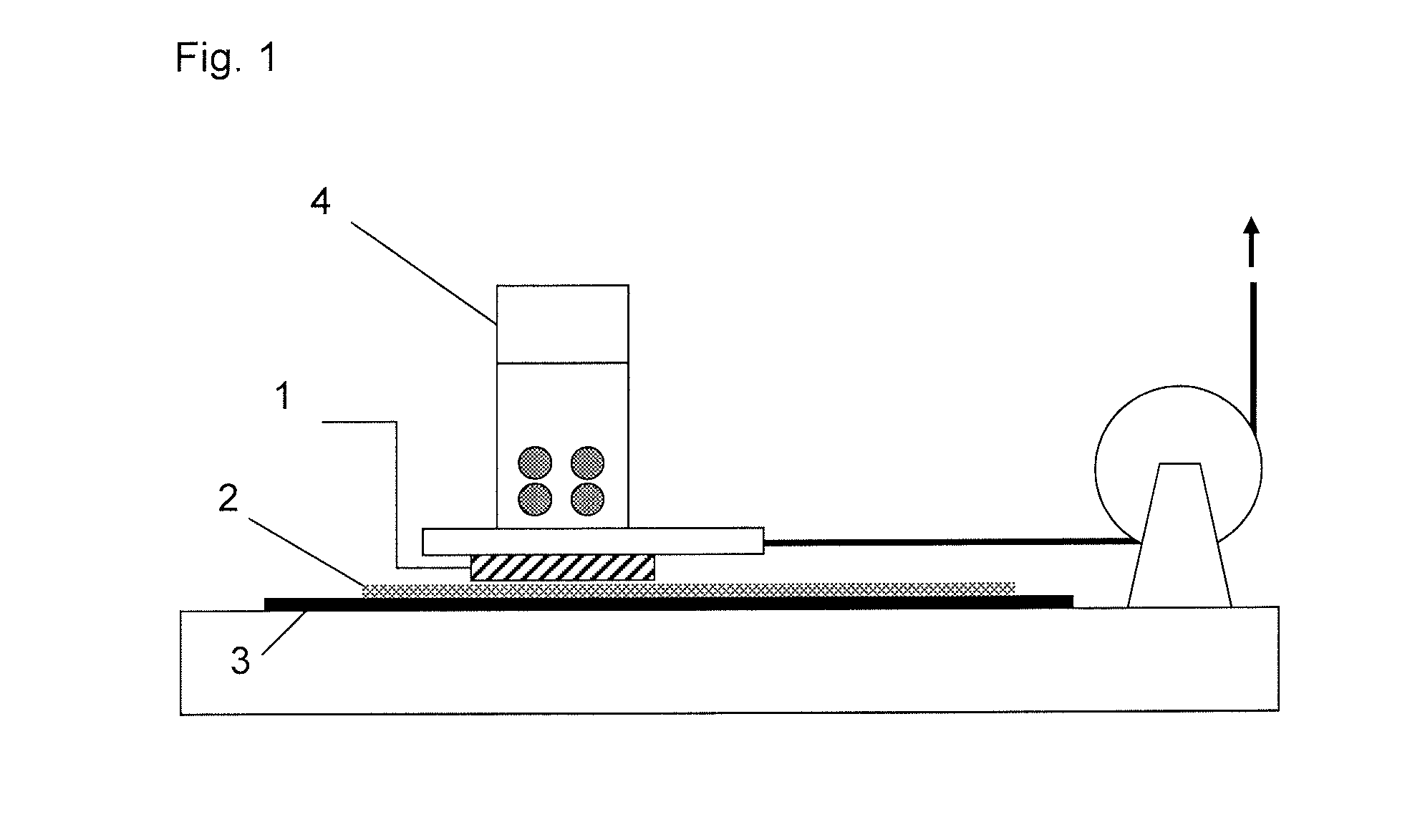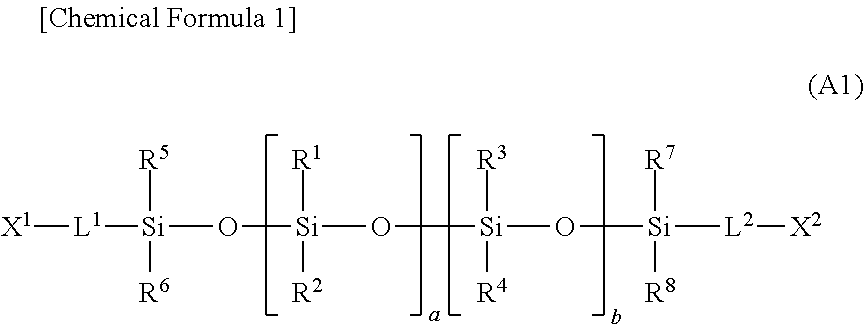Low water content soft lens for eye, and method for producing the same
a soft lens and low water content technology, applied in the field of eye soft lens with low water content, can solve the problems of contact lens water vaporization, contact lens wearers, bacteria growth risk, etc., and achieve the effects of reducing or avoiding a phenomenon, reducing the risk of bacteria growth, and low water conten
- Summary
- Abstract
- Description
- Claims
- Application Information
AI Technical Summary
Benefits of technology
Problems solved by technology
Method used
Image
Examples
reference example 1
[0170]Polydimethylsiloxane having a methacryloyl group at both ends (DMS-R31, Gelest, Inc., below-mentioned compound of the formula (M2), weight average molecular weight of 30,000, number average molecular weight of 13,000) (20 parts by weight) as a component A, trifluoroethyl acrylate (Biscoat 3F, Osaka Organic Chemical Industry Ltd.) (80 parts by weight) as a component B, IRGACURE® 1850 (Ciba Specialty Chemicals Inc., 2 parts by weight) and tetrahydrolinalool (20 parts by weight) were mixed and then stirred. As a result, a uniform and transparent monomer mixture was obtained. This monomer mixture was charged in a test tube and degassing was carried out under reduced pressure of 20 Torr (27 hPa) while stirring using a touch mixer, and then the pressure was returned to atmospheric pressure using an argon gas. This operation was repeated three times. In a glove box under a nitrogen atmosphere, the monomer mixture was injected into a mold for contact lens made of a transparent resin (...
reference examples 2 to 12
[0171]In the very same manner as in Reference Example 1, except that the use amounts of components A and B were changed to amounts shown in Table 1, moldings were obtained. Both the obtained moldings had a water content of less than 1%. The evaluation results of the obtained molding are shown in Table 1.
TABLE 1Evaluation resultsElongationComponent AComponent BSi atom(number ofTensileDMS-R31Biscoat 3FContentspecimenselasticElongation(Parts by(Parts by(% bywhich wereFoldingmodulusat breakweight)weight)weight)Transparencynot broken)resistance(kPa)(%)Reference Example 120807.4Reference Example 2406015A5A450400Reference Example 3455517A5A510250Reference Example 4505019A5AUnevaluatedUnevaluatedReference Example 5554520B5AUnevaluatedUnevaluatedReference Example 6604022C5A560270Reference Example 7653524C5AUnevaluatedUnevaluatedReference Example 8703026C5AUnevaluatedUnevaluatedReference Example 9752528C5AUnevaluatedUnevaluatedReference Example 10802030C5A470270Reference Example 11100037D3AUn...
reference examples 13 to 19
[0172]In the very same manner as in Reference Example 1, except that polydimethylsiloxane having a methacryloyl group at both ends (DMS-R22, Gelest, Inc., below-mentioned compound of the formula (M2), weight average molecular weight of 8,300, number average molecular weight of 7,400) was used in the amount shown in Table 2 as a component A, and that trifluoroethyl acrylate (Biscoat 3F, Osaka Organic Chemical Industry Ltd.) was used in the amount shown in Table 2 as a component B, moldings were obtained. The obtained molding had a water content of less than 1%. The evaluation results of the obtained molding are shown in Table 2.
TABLE 2Evaluation resultsComponentComponentSi atomElongationTensileA DMS-R22B Biscoat 3Fcontent(number ofelasticElongation(Parts by(Parts by(% byspecimens whichFoldingmodulusat breakweight)weight)weight)Transparencywere not broken)resistance(kPa)(%)Reference Example 1310903.7C5BUnevaluatedUnevaluatedReference Example 1420807.3A5B630190Reference Example 1540601...
PUM
| Property | Measurement | Unit |
|---|---|---|
| water content | aaaaa | aaaaa |
| tensile elastic modulus | aaaaa | aaaaa |
| water content | aaaaa | aaaaa |
Abstract
Description
Claims
Application Information
 Login to View More
Login to View More - R&D
- Intellectual Property
- Life Sciences
- Materials
- Tech Scout
- Unparalleled Data Quality
- Higher Quality Content
- 60% Fewer Hallucinations
Browse by: Latest US Patents, China's latest patents, Technical Efficacy Thesaurus, Application Domain, Technology Topic, Popular Technical Reports.
© 2025 PatSnap. All rights reserved.Legal|Privacy policy|Modern Slavery Act Transparency Statement|Sitemap|About US| Contact US: help@patsnap.com



